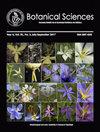利用数字图像自动监测花旗松花粉质量:在处理和储存方面的应用
IF 0.7
4区 生物学
Q3 PLANT SCIENCES
引用次数: 0
摘要
背景:森林物种的保护和育种计划需要高效的花粉质量监测策略,以便最大限度地收集、储存和授粉。 问题能否使用 ImageJ 图像分析软件来有效监测花粉的存活率和发芽率,以进行质量检测? 研究物种:Pseudotsuga menziesii (Mirb.) Franco 方法:采用四氮唑染色法和 10 % 蒲公英培养基发芽法检测花旗松花粉质量。利用数字化显微图像,使用 ImageJ 免费软件开发了两个自动计数宏,并对其进行了测试,以评估产地、在不同培养基中的发芽情况、脱水/复水和冷冻储存处理,最后比较成熟树木和 GA 诱导的幼树茎生花粉的质量。 研究结果花粉质量的自动监测是可行的,因为该软件可通过不同的四唑染色(可转化为像素密度)适当区分有活力和无活力的花粉粒,而发芽率则根据花粉的大小和圆度进行评估。该工具用于指导选择适当的花粉处理条件,并比较成年树和 GA 诱导的幼树的花粉产量。花粉在-80 °C下急冻和储存后,在重新水化后可恢复到最初发芽率的74%到98%之间;然而,四氮唑检测到的存活率会降低,这表明处理和储存会影响测试的可靠性。 结论斐济软件的灵活性使我们能够开发出一种高效、准确的宏观方法来监测红景天花粉的质量,减少了所需投入的时间和精力,从而支持了未来对其保存生理机能的研究以及在种质生产中的成功应用。本文章由计算机程序翻译,如有差异,请以英文原文为准。
Automated monitoring of pollen quality in Douglas-fir using digital images: applications for handling and storage
Background: Conservation and breeding programs for forest species require efficient pollen quality monitoring strategies to maximize collection, storage and pollination efforts. Question: Can the ImageJ image analysis software be implemented to efficiently monitor pollen viability and germinability for quality testing? Studied species: Pseudotsuga menziesii (Mirb.) Franco Methods: Tetrazolium staining and germination on 10 % Brewback media was used to test Douglas-fir pollen quality. Two macros for automated counting were developed with ImageJ free software using digitized microscopic images, and were tested to evaluate provenances, germination in different media, dehydration/rehydration and freeze-storage treatments, and finally to compare pollen quality between mature trees and GA-induced strobili from juvenile trees. Results: Automated monitoring of pollen quality was feasible because the software suitably distinguishes viable from non-viable pollen grains due to differential tetrazolium staining that translates into pixel density, whereas germinability was assayed based on pollen size and circularity. This tool was used to guide the selection of appropriate pollen handling conditions and compare pollen production in adult and GA-induced juvenile trees. Pollen flash-freezing and storage at -80 °C showed recovery between 74 and 98 % of its initial germinability after rehydration; however, viability detected by tetrazolium is reduced, suggesting that handling and storage affect the reliability of the test. Conclusions: The flexibility of the Fiji software allowed the development of an efficient and accurate macro for monitoring P. menziesii pollen quality, reducing invested time and effort involved, which supports future research on its conservation physiology and its successful application for germplasm production.
求助全文
通过发布文献求助,成功后即可免费获取论文全文。
去求助
来源期刊

Botanical Sciences
Agricultural and Biological Sciences-Plant Science
CiteScore
1.90
自引率
21.40%
发文量
71
审稿时长
16 weeks
期刊介绍:
Botanical Sciences welcomes contributions that present original, previously unpublished results in Botany, including disciplines such as ecology and evolution, structure and function, systematics and taxonomy, in addition to other areas related to the study of plants. Research reviews are also accepted if they summarize recent advances in a subject, discipline, area, or developmental trend of botany; these should include an analytical, critical, and interpretative approach to a specific topic. Acceptance for reviews will be evaluated first by the Review Editor. Opinion Notes and Book Reviews are also published as long as a relevant contribution in the study of Botany is explained and supported.
 求助内容:
求助内容: 应助结果提醒方式:
应助结果提醒方式:


